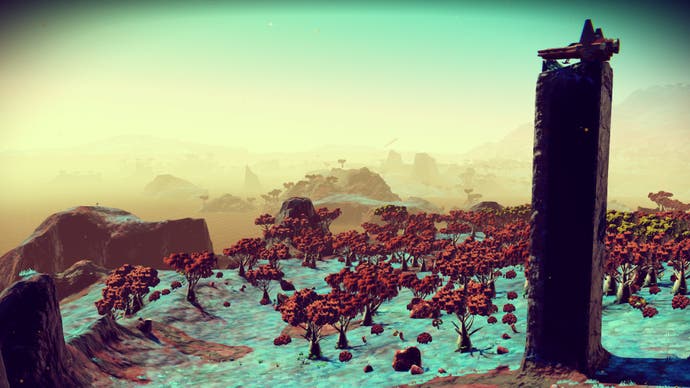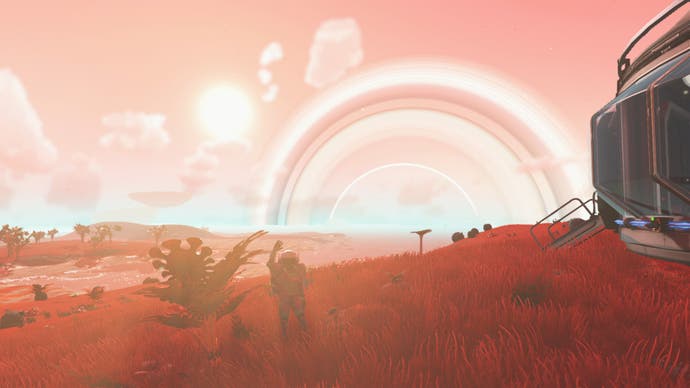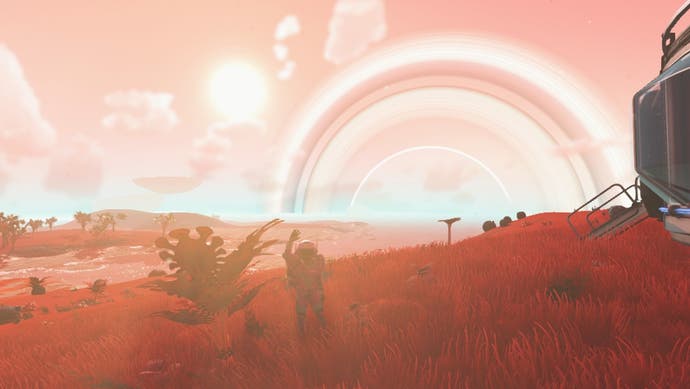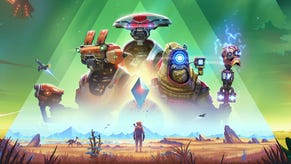Three years on, No Man's Sky is a messy wonder
Hello, is it me you're looking for?
It would be fair to say that No Man's Sky didn't receive the warmest of receptions when it launched back in 2016. Some players, of course, and I count myself among them, were mesmerised by its serenely nomadic spirit and infinite toy box of procedural wonders - while others were expecting something more.
Fleeing from the tsunami wave of animosity that followed, Hello Games retreated into the shadows and set down the path of what may be gaming's greatest redemption story. Now, three years and eight massive updates later, the No Man's Sky that once was and the No Man's Sky that is now are very different beasts.
Base building came first, followed by some wonderfully buoyant vehicles for spirited planetary exploration, then freighters (sort of portable-bases-meet-flying-garages), active solo and procedural questing, passive squad missions, improved flight and combat, cooking, farming, hydroponics, archaeology, electricity based logic systems, third-person perspective, VR support (both wonderfully tactile and, presently, rather unrefined), and plenty more.

Granted, those that never warmed to the kleptomaniac resource gathering and inventory juggling that has, since launch, underpinned No Man's Sky's genial intergalactic wandering are still unlikely to be won over three years on. But for those enamoured by its soothingly repetitive rhythms of acquisition and expansion, the No Man's Sky of today is an enormously gratifying game of dazzling breadth and ambition - but also, it has to be said, an absolute, heaving mess of disparate and often contradictory systems.
Off the top of my head, No Man's Sky now features five forms of currency (credits, nanites, quick silver, salvaged data, and navigation data), what amount to two entirely different base building systems, three concurrent narrative arcs and multitudes of overlapping side stories, three procedural questing systems, two almost-but-not-quite-identical upgrade systems, two system hubs, and that's just scratching the surface. The spaghetti-like end result, while wonderfully rich and giddyingly compelling in terms of sheer moment-to-moment possibilities, can be - even to long-time players like me, let alone newcomers - frequently bewildering.
It was a relief, then, when Hello Games shared word that No Man's Sky's latest Beyond update would finally see all those teetering, wobbling systems brought under some kind of control, and there are certainly improvements. Having started my adventure from scratch once more for Beyond's arrival, it's undoubtedly a more logically arranged and orderly experience compared to the barely restrained jumble of last year's Next update.
There are welcome, if often times quite subtle, interface tweaks and system reworks, and the result is a game that, while still defined by insatiable resource hoovering and menu fiddling, is far smoother, snappier, and more respectful of your time. Resource drops are more generous and stack higher in your inventory, tools last longer before needing a recharge, ships fly further, and, pretty much across the board, you're finally able to spend the bulk of your time getting things done rather than being constantly, tediously stalled by another depleted mechanism.

If Beyond drops the ball anywhere (aside from being an astonishingly, often haltingly buggy release that feels woefully premature), it's in its exhaustingly relentless slog of a tutorial.
On awakening on your first planet at the start of the game, you're dragged hither and thither by an interminable march of intergalactic errands that, rather than instilling you with awe and wonder at the limitless freedom afforded by Hello Games' gorgeous sandbox, immediately funnel you down a seemingly endless corridor of suffocating drudgery. It feels like far too heavy-handed an approach when, in a game about the joys of open-ended adventure and discovery, an occasional nudge in the right direction should do.
But once you wrestle free of those restrictions, No Man's Sky really is a wonder. Three years on, the allure of the unknown is as compelling as ever. And while familiarity has made the limitations of Hello Games' procedural generation engine more evident, tweaks to introduce greater variation and more classically breathtaking vistas mean that the game is still able to generate that same giddying thrill of discovery as the clouds part on a new planet for the very first time.
And the real kicker, of course, is that now, thanks to base building and its myriad dovetailing systems, No Man's Sky's gorgeous procedural landscapes are no longer simply transitory sights to screenshot before continuing on your way. Instead, each new vista is a welcome invitation to pause, to carve out a corner to call home, and make your own permanent mark on the universe.
What was once, essentially, a game of space tourism, of fleeting glimpses and forward momentum, is now, despite the lingering existential horror that underpins much of its philosophically bleak narrative, rich in purpose and possibility. Even if those possibilities do mostly start at the other end of a mining laser.
While some space sim fans prize realism and scientific authenticity above all else, all I've ever really wanted from the genre is the chance to live a convincing sort of life among the stars. And it's surprising to think that No Man's Sky, a game widely derided as lacking so much at launch, seems to have come closer to achieving that goal than the likes of Elite Dangerous and Star Citizen before it (although what I wouldn't give for Elite's flight model in No Man's Sky).
All those interlocking systems, as messy as they may be, give texture and a wonderfully chaotic sense of movement to Hello Games' universe - more so now that, since the advent of last year's Next update, you can live out your carefree space-existence alongside friends.
And while some might get dewy-eyed over the loss of No Man's Sky's early, lonely nomadic spirit, for me the shift to a universe buzzing with human life only serves to enrich the experience. It might just be sleight of hand (the game is still very far from being an MMO), but Beyond's newly introduced social hub, the Anomaly, never fails to instil a sense of awe as I touch down amid the chaotic hustle and bustle of arrivals and departures, of fellow human players dashing about, tending to their business, all trying to leave their own little legacy on that infinite procedural expanse.
I totally get that some players will never gel with the fact that Hello Games' grand sci-fi adventure - for all its aesthetic splendour, mechanical breadth, and existential ambience - is viewed through the lens of space domesticity, busywork, and genteel adventuring. But for me, No Man's Sky, with its mess and chaos, its life and spirit, its mundanity and wonder, has become exactly the sort of space game I always wanted it to be.










